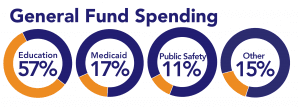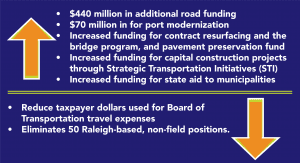The 2015 General Assembly Wrap Up
The General Assembly has concluded its 2015 legislative session, after being in Raleigh for more than eight months. The majority of the session was consumed with putting together a state budget to fund government over the next two years. The state budget for Fiscal Year 2016 is 21.7 billion dollars, which is an increase of 3% from FY 2015 appropriations. FY 2016 is similar to the pre-recession appropriation of 21.4 billion dollars in FY 2009. The three largest categories of the General Fund spending are education 57%, (which includes K-12, Community Colleges, and the UNC system), Medicaid 17%, and public safety 11% (which includes, corrections, juvenile justice, and the Highway Patrol).

After making significant changes to the tax code over the last two years, the General Assembly continued the trend in 2015 by rewriting tax laws this year as well. The finance provisions of the budget expands the sales tax base to include some services. It applies the sales tax to repair, maintenance and installation services on motor vehicles and tangible personal property. This expansion is effective 3-1-16.
Below is a synopsis of the tax package:
Tax Package
• Cuts Personal Income Tax Rate by 0.26% to 5.499%
• Increases Standard Deduction in 2016 from $15,000 to $15,500, non-taxable;
• Unlimited deduction for both Medical and Charitable;
• Maintains Corporate Income Tax rate reduction trigger (Current forecast has us hitting the trigger in 2016 dropping rate to 3%);
• Phases in Single Sales Factor over 3 years starting next year (study market-based sourcing);
• No extension of the Solar Tax Credit or R&D Tax Credit.
The General Assembly took a number of actions to increase transportation funding this session including ending the transfer of over 200 million dollars from the Highway Trust fund to the General Fund. They changed the motor fuel tax rate to produce a more stable source of revenue, an increased DMV fees.
Below is a synopsis of the transportation areas of the budget:
Transportation Highlights

The 2015 General Assembly Wrap Up
The General Assembly has concluded its 2015 legislative session, after being in Raleigh for more than eight months. The majority of the session was consumed with putting together a state budget to fund government over the next two years. The state budget for Fiscal Year 2016 is 21.7 billion dollars, which is an increase of 3% from FY 2015 appropriations. FY 2016 is similar to the pre-recession appropriation of 21.4 billion dollars in FY 2009. The three largest categories of the General Fund spending are education 57%, (which includes K-12, Community Colleges, and the UNC system), Medicaid 17%, and public safety 11% (which includes, corrections, juvenile justice, and the Highway Patrol).
After making significant changes to the tax code over the last two years, the General Assembly continued the trend in 2015 by rewriting tax laws this year as well. The finance provisions of the budget expands the sales tax base to include some services. It applies the sales tax to repair, maintenance and installation services on motor vehicles and tangible personal property. This expansion is effective 3-1-16.
Below is a synopsis of the tax package:
Tax Package
• Cuts Personal Income Tax Rate by 0.26% to 5.499%
• Increases Standard Deduction in 2016 from $15,000 to $15,500, non-taxable;
• Unlimited deduction for both Medical and Charitable;
• Maintains Corporate Income Tax rate reduction trigger (Current forecast has us hitting the trigger in 2016 dropping rate to 3%);
• Phases in Single Sales Factor over 3 years starting next year (study market-based sourcing);
• No extension of the Solar Tax Credit or R&D Tax Credit.
The General Assembly took a number of actions to increase transportation funding this session including ending the transfer of over 200 million dollars from the Highway Trust fund to the General Fund. They changed the motor fuel tax rate to produce a more stable source of revenue, an increased DMV fees.
Below is a synopsis of the transportation areas of the budget:
Transportation Highlights
• Eliminates the transfer from the Highway Fund to the General Fund;
• $440 million in additional road funding;
• $70 million in for port modernization;
• Increased funding for contract resurfacing and the bridge program, and pavement preservation fund;
• Increased funding for capital construction projects through Strategic Transportation Initiatives (STI);
• Continued funding for modernization of the Division of Motor Vehicles (DMV);
• Increased funding for state aid to municipalities;
• Reduce taxpayer dollars used for Board of Transportation travel expenses;
• Increases funding for airport development and the UAS program;
• Eliminates 50 Raleigh-based, non-field positions.
The General Assembly addressed many areas of economic development that are vital for many areas of the state, including reinstating the Historic Preservation tax credit so crucial for many rural areas of North Carolina. Also the General Assembly revamped the film grant to help boost the film production in North Carolina.
Below are a few of the highlights:
Other Highlights:
• $3 million for OneNC Small Business Fund
• $2.5 million annually for Rural Economic Development Grants;
• $30 million for Film Grants;
• $8 million in FY 2016-2017 for Historic Tax Credits;
Job Maintenance and Capital Development Fund (JMAC) funded on recurring basis, $6.9 million in FY 2015-2016 and $7.5 million in FY 2016-2017.
The General Assembly also made changes to the way Medicaid is administered by switching to a “hybrid” model in which commercial plans (insurance companies) and provider led entities, (hospitals and physician groups) will compete to run the program. This was done to try and bring more budget certainty to the state budget.
At the urging of Governor McCrory, the General Assembly approved a 2 billion dollar bond package that will go before the voters in March 2016. The statewide package focuses on infrastructure and includes 980 million dollars for the UNC system, 350 million dollars for community colleges, 310 million dollars for water and sewer infrastructure, 75 million dollars for state parks, and 70 million dollars for National Guard buildings across North Carolina.
The 2016 primary elections which have traditionally been held in May were moved to March 2016. Along with the primaries for all statewide offices, and all 170 seats in the North Carolina General Assembly.
The next session of the General Assembly will convene for the “short session” on Monday, April 25, 2016.
Get Involved!
Want to learn more about how you can be an active participant in Shop Local Raleigh’s advocacy? Contact us today and let us know you’re interested. We’ll keep you in the loop.







